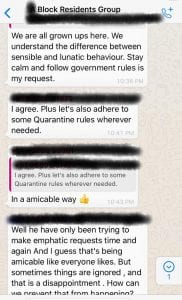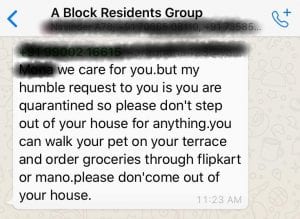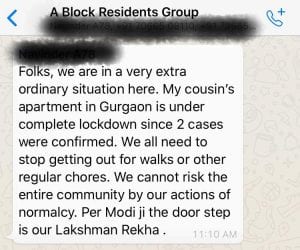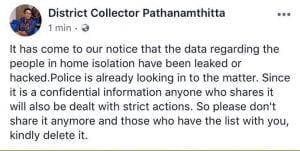
COVID-19: Karnataka does a China, puts quarantine data in public domain
In a bid to control the spread of coronavirus pandemic, the Karnataka government turned neighbours against each other when they published the list of those who returned from abroad and are put under home quarantine, in public domain.

In a bid to control the spread of coronavirus pandemic, the Karnataka government turned neighbours against each other when they published the list of those who returned from abroad and are put under home quarantine, in public domain.
While the government did not take any names, it disclosed their travel history and addresses for everyone to access on the state government’s website. A district-wise list of nearly 20,000 people and their personal data is out in the open.
Related news: Second COVID-19 death in Karnataka; man with no contact tests positive
Soon after the list was released on Tuesday (March 24), people started to download and circulate it on social media platforms.
 While on one hand it acted in favour of the residents to stay cautious, on a contrary, it also created chaos at several places, with the people starting to turn against their neighbours by imposing certain rules as to how they should behave and kept a strict vigil on the residents who are under home quarantine.
While on one hand it acted in favour of the residents to stay cautious, on a contrary, it also created chaos at several places, with the people starting to turn against their neighbours by imposing certain rules as to how they should behave and kept a strict vigil on the residents who are under home quarantine.
In some places, what started as a simple discussion on WhatsApp, later led to altercation so much so that the police had to intervene and warn people under home quarantine to adhere to the guidelines of staying indoors.
Related news: Home quaratine stamped-people to be arrested if found in public places, Bengaluru Police
The people, who are being home quarantined, are not COVID-19 patients but those who merely have some international travel history. However, the ostracisation and panic started to trickle in as the data remains in the public domain.
 In one of the high-rise apartment in the Central Bengaluru, while the family member of a person under home quarantine was out taking their dog for a walk, the other residents jumped in to stop them and insisting that they were risking others’ lives. The residents’ offered to help them to get the groceries and other essentials which could be dropped at their doorstep but asked them not to step out of the house.
In one of the high-rise apartment in the Central Bengaluru, while the family member of a person under home quarantine was out taking their dog for a walk, the other residents jumped in to stop them and insisting that they were risking others’ lives. The residents’ offered to help them to get the groceries and other essentials which could be dropped at their doorstep but asked them not to step out of the house.
“Many folks have seen them (one of the family members of a resident who’s under home quarantine) come out. We all are at serious risk. No offense to those under quarantine, but walking down the stairs for dog’s sake is no answer,” a resident from the building said.
Meanwhile, the residents’ association urged the regional assistant commissioner of police (ACP), who was doing the rounds in the city, to explain to the residents on loudspeaker about the importance of being under home quarantine.
 Officials from the state government are also visiting those people under home quarantine and stamping them, besides putting a notice outside their houses. In addition to this, the government is also mulling to track them using a mobile app and warned of putting them under mass quarantine if someone is seen violating the rules.
Officials from the state government are also visiting those people under home quarantine and stamping them, besides putting a notice outside their houses. In addition to this, the government is also mulling to track them using a mobile app and warned of putting them under mass quarantine if someone is seen violating the rules.
Speaking to The Federal, ACP Tabarak Fathima said, “This is when communities should come together and help those under quarantine. Considering the spread of the coronavirus, the government put out the data with a good intent so that their neighbours can be aware.”
“Data can be used wisely and also misused. And that’s why we are going to gated-communities, nearby slums and creating awareness about the virus. We are also advising residents’ association to not ostracise those under home-quarantine,” Fathima added.
A similar data was released by the Punjab government, while in Kerala the data was allegedly leaked.
Related news: COVID quarantine: It is a different connotation for urban and rural residents
Interestingly, the move was earlier tried and tested by the Chinese government, who also released the data of those in quarantine in Wuhan, the epicentre of the coronavirus outbreak.
The Delhi government too has posted notices outside the hoses of those under surveillance.
Delhi govt is marking all homes with persons advised to home quarantine. I appeal to all not to stigmatize such families. Please be empathetic and supportive towards them. The marking is aimed only at cautioning others for their own safety. #DelhiFightsCorona https://t.co/4U0CbwaOQG
— Arvind Kejriwal (@ArvindKejriwal) March 22, 2020
However, unlike Karnataka and Punjab, the Kerala government considers it as confidential information and are keen to punish those sharing the data.

PB Nooh, Pathanamthitta district collector in Kerala put out a message on her social media accounts asking those who have the list to delete the data and warned them of the strict action which could be taken if anyone continues to share the data.
While the country lacks a data protection policy, publishing such details amounts to gross violation of an individual’s fundamental rights.
The much awaited national data protection law, the Personal Data Protection Bill 2019, has been referred to a joint parliamentary committee. The bill is yet to be adopted as a law.
Related news: Number of COVID-19 cases rise to 724 in India, death toll at 17
Nikhil Pahwa, the founder of news outlet Medianama, who has been in the forefront of freedom of internet and data protection policy said, “While the Karnataka government’s action is a violation of fundamental rights of citizens, it will have dangerous implications where people could resort to moral policing.”
The draft data protection bill gives an exemption to the government to process data under Section 12 in case of a health emergency. However, Pahwa said the government can use that for its purpose but not put it on a public domain and risk citizens’ lives.
“It certainly violates one’s fundamental right. The government has to prove that putting out such data is an absolute necessity and proportionate. Otherwise there is no need for them to do so,” he said.


